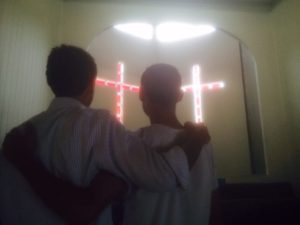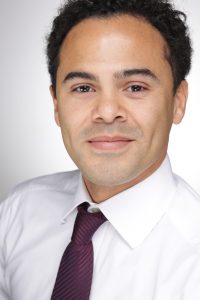God Workings through a Refugee-Welcoming Church: A Testimony on the Rebirth of Bethel IBC and the Birth of All4Aid
He [the Lord] shows love to the foreigners living among you and gives them food and clothing. So you, too, must show love to foreigners, for you yourselves were once foreigners in the land of Egypt. (Deuteronomy 10:17-19)
It was a cold Sunday morning in January 2014. I had recently moved to Germany to pastor Bethel IBC in Frankfurt. As I stood at the front leading the service, a young Afghani man entered the church for the first time. Visibly nervous, he kept walking from one side to the other at the back of the church, anxiously staring at me. When the service ended, he ran to me and started sharing his life story and the reason why he was there. I didn’t know it at that time, but that encounter would set in motion a series of events that would transform my ministry in ways I could never imagine!
The church, at that time, was in desperate need of revitalization. The challenges were not just low attendance, low income, and financial debt. The ministry structure was obsolete. The church building was run down and located in a part of town that was not so easily accessible. To make matters worse, the church had recently experienced some theological confusion. Despite all of this, there was something very special about that church — the people. They were some of the most loving and welcoming people I had ever met. I noticed that on my first visit. That really drew me to them. Following God’s call and their invitation, I accepted to come as their new pastor.
“Are you the pastor?” the young Afghani man asked me. Then, pulling up the leg of his trousers, he showed me a bullet wound scar and said, “My name is *Nek. I’m a Muslim and a former elite policeman from Afghanistan, trained by the U.S. forces. I was shot by the Taliban in a battle, but I survived, managed to escape and later fled the country. When I arrived here in Germany, I had a dream where I saw a man in a white robe saying to me, ‘I am the way, the truth, and the life’. I told people in camp about my dream and someone said this is in the Bible. Is it true?”
Jesus had introduced himself to *Nek in a dream! I knew Jesus could do that. Still, I was in awe! In the weeks that followed *Nek was discipled and baptized. A couple of months later, we baptized another 10 refugees. Nearly every Sunday, new refugees showed up at church. As they learned about Jesus, the congregation also learned about their needs and responded by helping them to find housing, apply for jobs, access legal support, and enroll in language classes. It was beautiful!
At some point, refugees made up about 40% of the Sunday services attendees. You could see them serving every where, as part of the welcome team, in the kitchen team, or playing instruments in the worship team. Our services started being translated into Farsi. A Farsi-speaking weekly Bible study was launched. Two Muslim-background evangelists were employed by the church in partnership with a mission organization. An Iranian refugee man was elected as an elder.
where, as part of the welcome team, in the kitchen team, or playing instruments in the worship team. Our services started being translated into Farsi. A Farsi-speaking weekly Bible study was launched. Two Muslim-background evangelists were employed by the church in partnership with a mission organization. An Iranian refugee man was elected as an elder.
Between 2014 and 2018, we baptized 67 refugees in the baptism pool of the church. The two evangelists and I baptized hundreds of other refugees in lakes, swimming pools, and even bathtubs. Most of these newly converted refugees came from countries such as Iran, Afghanistan, Pakistan, and Iraq. With time, most of these brothers and sisters integrated into German society, learned the German language, and slowly found their way into German-speaking churches.
It is amazing to look back and see how God injected “life” into Bethel IBC, at a time when that was critically needed, and how He used the influx of refugees and the love of the members as catalysts for the church’s revitalization. Bethel IBC today has a new name (Multination Church), a new vision (multiplication), a new Sunday service venue (a nice hall at the city center), and a new financial situation (savings instead of debts). The church is free from the burden of building ownership and is poised for a new season of greater ministry success under a new pastor Mason Smith.
But God did not stop there. That refugee-welcoming church environment also fostered in 2017 the birth of All4Aid, a Christian non-profit organization that pursues the vision of “displaced people attaining life in all its fullness” (John 10:10b). The original idea for All4Aid was simply to create a different type of legal entity to work in parallel with the church and serve refugees locally. For instance, as a non-profit, we would gain access to refugee reception centers much more easily.
However, soon All4Aid started being given opportunities to expand. An NGO (non-governmental organization) decided to give All4Aid their fully equipped community center on Lesvos, Greece. A mission organization covered a large portion of All4Aid’s costs in 2019. Three members of Bethel IBC felt called to become full-time All4Aid missionaries. Later on, All4Aid was gifted another community center in Cyprus. More recently, three buildings in Romania were offered for All4Aid to house Ukrainian refugees.
Today we (All4Aid) find ourselves working on an annual budget of approximately one million Euro, leading a team of about 30 people (support-based missionaries, locally hired employees, and community volunteers included), mobilizing more than 100 short-term volunteers annually, and managing missionally designed programs in a few countries. We also find ourselves providing accommodation for up to 89 refugees of war and transporting 3,000 kilograms of food every week into Ukraine to bless local church partners. I cannot explain All4Aid’s growth, except to say it is God.
Now, based on the lessons we have learned these past years, I would like to leave you with five practical suggestions which are applicable to churches conducting any type of refugee ministry:
- Embrace the concept of integral mission.
Our understanding of mission today is still impacted by modernity and its dichotomous perspective of reality: spiritual and physical, sacred and secular. From there, and making a big generalization for the sake of brevity, Christians have developed two main concepts of mission. On the one hand are the “evangelicals,” who see people mostly spiritually and in need of evangelism. On the other hand are the “liberals,” who see people mostly physically and in need of social justice.
Integral mission, I would argue, is a more biblical theology of Christian engagement with the world. At its core is the idea that there should be no division between belief and practice or between faith-sharing (proclamation of the gospel) and social action (demonstration of the gospel). Rather, following the example of Jesus, the church’s mission should be to bring the gospel in a multidimensional way that meets peoples’ needs holistically. I would encourage you to consider how your church’s engagement with refugees could contemplate both spiritual and material needs.
- Be moved by vision and calling, not by needs.
Meeting the material needs of refugees can be overwhelming, especially if you try to meet different needs without boundaries. I would encourage you to define your vision and calling, considering what is manageable and feasible and establishing the specifics of your engagement (what you will do, how and when). We, for instance, defined that we would help refugees on Lesvos with showers, laundry, food, and clothes but never with travel to/from the island – no matter how sad or desperate their situation may be. It may sound harsh but being moved by vision is essential in refugee ministry. It prevents you from developing a “savior complex,” from getting “lost” in the midst of the needs you try to meet, and from getting burned out, ultimately becoming ineffective. It allows you to focus on what God has called your church to do and on doing that with excellence.
- Look out for the most vulnerable.
Since you can never meet all the material needs of all the refugees around you, many times you will have to establish some criteria for who exactly you are going to serve. As you do, I would encourage you to look out for the most vulnerable. Some of that might be obvious. In general, refugee women and children are more vulnerable than men. A single mother with young children is more vulnerable than a couple with young children. However, sometimes it is not so easy to make that judgment. Romani people with Ukrainian nationality are more vulnerable than Slavic Ukrainians. Afghani refugees from the Hazara ethnic group are more vulnerable than Pashtun Afghans. Learn about the people you are engaging with, and look out for the most vulnerable.
- Make sure you follow good practices and meet legal requirements.
Having a good heart and willingness to help is great. But, depending on your type of engagement, it is very likely that you will need to implement rules and policies. They might be based on common sense, on your voluntary commitment to adhere to “good practices,” or on your duty to meet legal requirements. If your church does not have policies on Health & Safety and on Children’s Safeguarding, for instance, I would encourage you to work on them. If you are getting involved with more complex activities classified as humanitarian aid, I would encourage you to get acquainted with the SPHERE minimum standards and other guidelines and regulations.
Let’s ponder the scenario of a church wanting to use its building as accommodation. Taking into consideration SPHERE standards, each person should probably have at least 5 square meters of living space and share a toilet with a maximum of 20 people. Families should be kept together, and single men and single women accommodated separately. Fire exits should be marked and clear, and beds or mattresses laid out in such a way that wide corridors are kept for people to safely evacuate in case of an emergency. The accommodation should only be accessible by the refugee guests and by those accredited to work with them. It shouldn’t be a publicly accessible space where anyone can walk in. Following these types of good practices and legal requirements would be essential not only to help protect the refugees’ integrity, but also to protect the church’s reputation.
- Request references and police background checks on volunteers and hosts.
Your volunteers will be engaging with vulnerable people who are easily susceptible to abuse. Whether you are taking volunteers for a short visit to a refugee shelter or are asking families to host refugees in their homes, do not assume that you know your volunteers’ character or that their willingness equals good character. I would strongly advise you to request at least two references on those engaging with refugees under supervision (those serving as a group and together with a leader). If volunteers will engage with refugees in a manner that they are alone with them in unsupervised settings – for example, hosting refugees in their own houses – I would recommend that, in addition to references, you request police background checks. I know this goes against the culture of most local churches. But, as the old saying goes, it is much better to be safe than sorry.
Closing
As Russia’s invasion into Ukraine once again pushes the theme of refugees to the forefront of debate in our society and challenges us to consider how churches should respond, I hope that the testimony of what God has done through a refugee-welcoming IBC church in the not-so-distant past can be an encouragement to you. In a similar way, as you discern and plan any engagement with refugees, I hope that the practical suggestions that I shared based on the lessons we learned these past years can be useful to you.
If you would like to learn more about All4Aid, please contact me at [email protected] or visit our website – all4aid.org.

by Rodrigo Assis da Silva
Managing Director, All4Aid and Former Pastor, Bethel IBC


